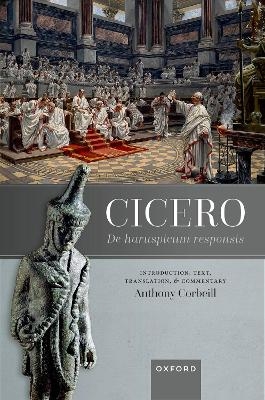
Cicero, De haruspicum responsis
Oxford University Press (Verlag)
978-0-19-286895-4 (ISBN)
During the Roman Republic, any unnatural event occurring in nature--from a talking cow to a hermaphrodite to an earthquake--was deemed a prodigium. A prodigy signaled awareness of a rupture of order not only in nature but in politics and morality. As a result of its cosmic significance, any potential prodigy demanded authentication. Unsurprisingly, prodigies proliferate during political crises, such as the violent times of 56 BCE. What perhaps does occasion surprise is that in the process of expiating a prodigy, the Roman senate monitors each individual step. And yet, despite the hundreds of allusions to prodigies in ancient texts, only one source provides insight into the senatorial process of analysis, assessment, and resolution. That text is Cicero's speech before the senate, De haruspicum responsis ('On the Responses of the Haruspices').
On this occasion the senators summon for assistance a group of Etruscan priests (haruspices). Herein lies an apparent paradox: the senate entrusts an elemental decision about divine attitudes to a group of foreign priests from the obscure culture of a long-conquered people. The haruspices duly produce from their books of Etruscan lore a cryptic response. This response--the only version of such a response surviving--became the subject of a speech delivered by Cicero's archnemesis Clodius, detailing how Cicero's return from exile prompted this disruption of the natural world. The next day, Cicero argues in De haruspicum responsis the opposite: in the presence of Clodius, he engages in a character assassination that corresponds with a close line-by-line reading of the response. Cicero teaches the senate how to read Clodius's guilt in the reaction of the natural world.
In addition to explicating rhetorical and syntactic features, this commentary details the interplay of Etruscan and Roman religious traditions. During a period of gang violence, arson, and murder, the haruspical response achieves what Cicero, Clodius, and the Roman senate could not have effected unaided: introduce into senatorial deliberations a seemingly objective assessment of divine intention. Through rational political debate, a peaceful natural world is restored, one that rests upon the logical analysis and rhetorical prowess of a Cicero.
Anthony Corbeill is Basil L. Gildersleeve Professor of Classics at the University of Virginia. He received his PhD from the University of California, Berkeley and is author of Controlling Laughter: Political Humor in the Late Roman Republic (Princeton, 1996), Nature Embodied: Gesture in Ancient Rome (Princeton, 2004), and Sexing the World: Grammatical Gender and Biological Sex in Ancient Rome (Princeton, 2015). He has held fellowships at the Thesaurus Linguae Latinae (Munich), American Academy in Rome, Institute for Research in the Humanities (Madison), All Souls and Corpus Christ Colleges (Oxford), and the Institute for Classical Studies (London).
Acknowledgements
List of abbreviations
Introduction
A. Historical background
B. Cicero's oratory upon his return
C. Style
D. Authenticity of the speeches Post reditum
E. The speech De haruspicum responsis
F. Religious background: Roman prodigies and Etruscan haruspices
G. The Haruspical Response: text, style, and content
H. Note on the Latin text
I. A note on the translation
Text and translation
M. Tulli Ciceronis oratio de haruspicum responsis
Commentary
Bibliography
General index
Index verborum
| Erscheinungsdatum | 30.08.2023 |
|---|---|
| Verlagsort | Oxford |
| Sprache | englisch |
| Maße | 160 x 242 mm |
| Gewicht | 778 g |
| Themenwelt | Literatur ► Klassiker / Moderne Klassiker |
| Sachbuch/Ratgeber ► Beruf / Finanzen / Recht / Wirtschaft ► Briefe / Präsentation / Rhetorik | |
| Geschichte ► Allgemeine Geschichte ► Altertum / Antike | |
| ISBN-10 | 0-19-286895-0 / 0192868950 |
| ISBN-13 | 978-0-19-286895-4 / 9780192868954 |
| Zustand | Neuware |
| Haben Sie eine Frage zum Produkt? |
aus dem Bereich


